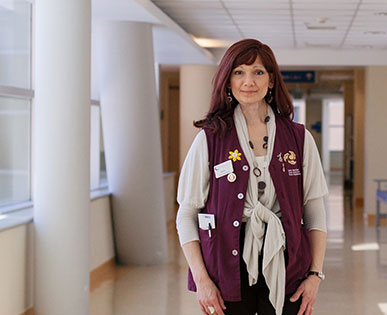Maria has volunteered at TGH and PMH for over six years. (Video: UHNToronto YouTube)
Maria Filosa knows firsthand how a cancer diagnosis can change your life.
A surgery to remove a malignant tumour eight years ago meant that she would also lose 70 per cent of her tongue.
"It was devastating," she remembers.
Then and there, Maria resolved that she would find a way to help patients like her, who had to adapt to a new way of life, re-learn certain tasks and build a network of support.
After recovering from surgery, chemotherapy, and radiation treatment, Maria became a volunteer in the two places she had come to know best as a patient: the Head and Neck Unit at Toronto General Hospital, and the Princess Margaret Cancer Centre, through the Healing Beyond the Body volunteer group.
"I felt I had to do this," she says. "I needed to be there for those patients."
Two thousand strongMaria started to devote her time to UHN more than six years ago.
As a volunteer, she has been part of a large group at UHN. There are close to 2,000 people actively volunteering across all four sites. Every day, these people contribute in various ways – all to better the well-being of patients at UHN.
For Maria, volunteering at the hospital came naturally. She took the lessons she had learned as a patient and integrated them into her daily work.
"When I was a patient I sometimes felt alone. I had to learn some things on my own. Now there are many more services available to patients," Maria says. "I'm happy to have been part of increasing that support."
The power of listening
The most important teaching she learned as a patient that she carried over into her work as a volunteer is that everyone has a story to tell, and everyone appreciates a listening ear.
"Patients and their family members have something to say," Maria says. "I remember thinking, 'I need to tell my story.' It's a part of the therapy, and I always made sure to consciously let patients tell me their stories."

Volunteering is therapeutic and gratifying, Maria explains. (Photo: Anthony Tuccitto )
She has been there to listen and offer advice based on her experience. For many head and neck patients, treatment will alter how they can work within social situations, Maria says. Getting used to impaired speech or trouble swallowing, for example, can be tough.
"I always say: focus on one day at a time," she says. "You'll have good days and bad days, but eventually you'll have more good days than bad."
Overall, volunteering has helped Maria find clarity in her life.
"It's been very therapeutic for me. It's really a two-way street. I would take bits of patients' stories and learn from them – that has helped me."
For her, gratitude from patients and their families has been a highlight, but never a necessity.
"I'm the one who is privileged that they have shared their stories – it's very humbling."
It's something you can't turn off
Maria recently retired from her volunteering career, but she still marks her time with patients as some of the most important work she has been a part of.
"What you get from volunteering is priceless," she says. "Volunteering is part of who I am. It's not something you can shut off, like a light switch."
"I would still say it's the best part about me."
If you are interested in joining volunteers like Maria at UHN, please visit the UHN Volunteer Resources webpage. As Maria advises: "If you have the time and an eagerness to help, you should always take an opportunity to volunteer."
